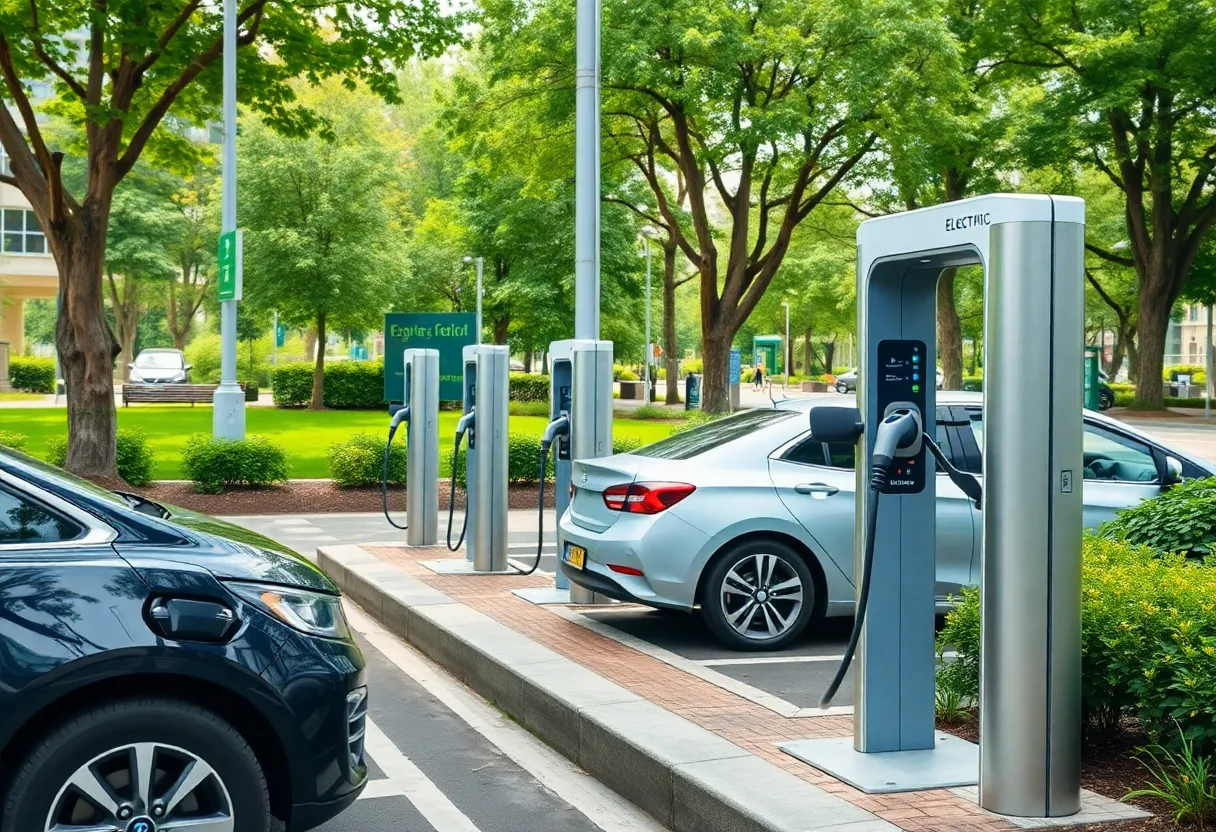

A modern electric vehicle charging station in an urban setting, highlighting the need for expanded EV infrastructure.
Michigan is pausing its ambitious EV charging network expansion due to a federal funding freeze linked to the Trump administration’s policy rollbacks. Despite the setback, the Biden administration has allocated $521 million in federal grants to improve charging infrastructure in cities like Ann Arbor and Detroit, focusing on increasing accessibility in low-income neighborhoods. The state aims for 100,000 public chargers by 2030, though currently, there are fewer than 2,000 available, highlighting the urgent need for infrastructure development as EV adoption rises.
In a surprising turn of events, Michigan is hitting pause on its ambitious expansion plans for the electric vehicle (EV) charging network. The decision comes on the heels of a federal order that has put a freeze on funding, a move tied to the Trump administration’s efforts to roll back the climate policies initiated under the Biden administration.
Earlier this month, on February 7, the Michigan Department of Transportation (MDOT) announced that it would be halting its plans under the National Electric Vehicle Infrastructure program. This decision coincides with a nationwide freeze on a notable $5 billion initiative aimed at constructing much-needed EV chargers across the country.
While the state navigates this funding hiccup, not all is bleak. The Biden administration recently unveiled a significant boost for Michigan’s electric vehicle infrastructure, allocating a total of $521 million in federal grants. Specifically, the city of Ann Arbor is set to receive $2.8 million from this initiative, which will go towards installing 48 EV chargers throughout the city.
The targeted installation sites include public spaces such as park-and-ride lots, multi-unit housing, and various retail spaces. This strategic approach aims to enhance the accessibility of EV charging, particularly in low-income neighborhoods, where the need for convenient charging options is most pressing.
These new chargers are an integral part of Ann Arbor’s ambitious A2Zero Plan, which aims to achieve carbon neutrality by the year 2030. It’s a crucial step in the city’s ongoing efforts to create a more sustainable future.
U.S. Secretary of Energy has highlighted that the federal investment isn’t just about boosting infrastructure; it’s also designed to create jobs and ensure that those jobs are good-paying positions serving local communities. Nationally, this funding initiative aims to build more than 9,200 EV charging ports across the United States.
Since the Biden administration came to power, the landscape of publicly available EV chargers has dramatically changed—more than doubling in number. Currently, around 168,388 public EV charging ports can be found across the country, with an impressive addition of approximately 1,000 new public chargers each week.
Back in Michigan, the state has set an ambitious goal of establishing 100,000 publicly accessible EV chargers by the year 2030. However, as of April, the state had fewer than 2,000 available chargers. According to the Department of Transportation, the current reliability rate for public chargers stands at a respectable 81%. Yet, the rapid growth of electric vehicles is outpacing the development of charging infrastructure.
In addition to Ann Arbor, Detroit will also benefit from this federal initiative with a hearty $23.4 million grant. This funding aims to deploy charging stations across various community-based locations, focusing on equity and accessibility to ensure that all residents can comfortably transition to electric vehicles.
While this temporary halt in expansion has caused a stir, the future still looks bright for Michigan’s EV initiatives. With grants funneling into cities like Detroit and Ann Arbor, the hope remains that the road ahead will lead toward a more interconnected, environmentally friendly, and accessible charging network for all.
As cities work hard to adapt and advance their EV infrastructure, one thing is clear: the drive toward a greener future is continuing, even if it hits a few bumps along the way.
News Summary The U.S. Department of Education has unexpectedly revoked nearly $42 million in COVID…
News Summary Novi City Council has approved a proposal for a $120 million bond aimed…
News Summary Prima Medicine has added Dr. Mandana Shafai to their team as a Concierge…
News Summary Idaho has become the eighth U.S. state to extend foster care benefits to…
News Summary The music industry is buzzing with job opportunities for digital marketing professionals. Prominent…
How Can You Use Social Listening to Inform Your Digital Marketing Strategy? Introduction In today's…